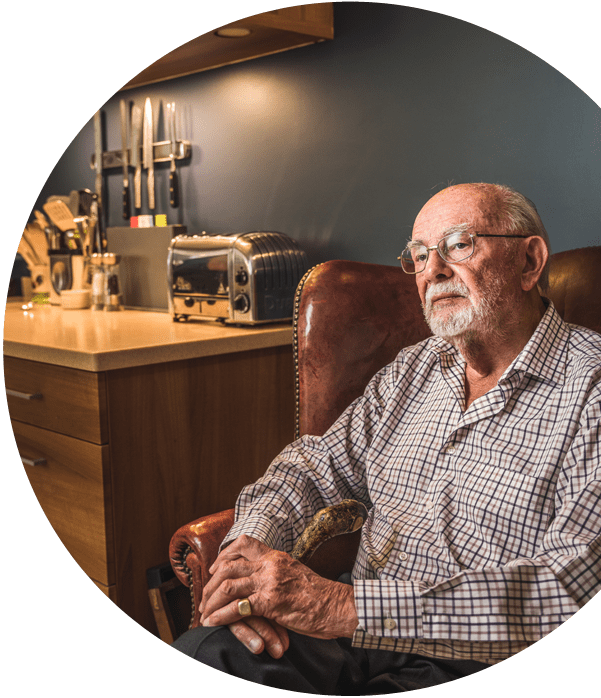Elderly incontinence
Helping your loved one with elderly incontinence
Incontinence describes an accidental or involuntary loss of urine or faeces. It is very common among elderly people. However, it is rarely discussed as it is considered a taboo subject. Many elderly people feel ashamed and embarrassed about incontinence concerns. This can mean they are very reluctant to ask for help. For people who need incontinence help this can really impact the quality of their life and overall well-being.
Women are more often affected by incontinence with 75% of those over 65 reporting urine leakages.
For elderly people in care homes, 30-50% of them will need incontinence care. 60-70% of people living with dementia or Alzheimer’s disease will be incontinent.
Here we discuss incontinence care topics to help you support your loved one. We hope you are then able to have sensitive conversations about incontinence to help and support your loved one. Topics we cover include:
- The cause of incontinence in the elderly
- How to help your loved one if they have incontinence
- What products can be used to help with incontinence
- How live-in care can help elderly people with incontinence
The causes of incontinence in the elderly
Incontinence can happen for many different reasons. Some causes are common in both men and women, but others affect men alone. Common reasons for incontinence in the elderly is a urinary tract infection (UTI), vaginal infection or irritation or constipation. Regular medications can also cause a loss of bladder control, but this is unlikely to last too long.
Other causes of urinary incontinence include:
- Weak and/or overactive bladder muscles
- Weak pelvic floor muscles
- Pelvic organ prolapse. This is when pelvic organs are out of place.
- Nerves that control the bladder may be impacted by conditions such as Multiple Sclerosis, Parkinson’s disease or diabetes.
- Reduced mobility/frailty or conditions such as arthritis that prevent a person going to the bathroom quickly
- An enlarged prostate in a man can cause a blockage
- Injury or damage to the nerves or muscles in the bladder from surgery
- There is a problem with the bladder and urethra that cause urine to leak
If you are worried that your loved one needs incontinence care, you should contact your GP. They will be able to determine what may be causing the issue and will advise of other services available, including an NHS Continence Clinic near you. They have specialist nurses who can provide more specific guidance and support. They will also be able to advise on products that can help your loved one’s situation depending on what is causing the incontinence.

Dementia and incontinence care
For those who are living with dementia, particularly in later stage dementia incontinence problems are very common. This can be due to:
- Not reacting quickly enough to the sensation of needing to use the toilet
- Being unable to get to the toilet in time
- Problems with communication mean a person with dementia may not be able to tell someone they need to go to the toilet
- Not understanding a prompt from someone to use the toilet
- Being unable to remember where the toilet is caused through confusion associated with environment
- Undoing clothing can be a problem due to coordination issues and can cause accidents
- Refusing help to use the toilet
- The embarrassment caused by an accident may mean a person living with dementia hides their soiled clothes and then forget they have done so.
For families who are struggling with incontinence care, a professional dementia carer may be the answer. They will be able to support your loved one with incontinence care. With live-in care, a trained carer is on hand around-the-clock to make sure incontinence needs are met. They will support your loved one sensitively and respectfully to visit the bathroom, monitor their fluid intake and help with changing any pads needed.
The Alzheimer’s Society publishes useful information about the issues associated with incontinence and those living with dementia.
How to support your loved one with elderly incontinence
HOW TO DEAL WITH OLDER GENERATION INCONTINENCE
The first step to take when addressing a loved one who is living with incontinence is to sensitively discuss the situation with them. This will make them feel like they are in control of the situation. It is important for them to agree to see their GP or nurse practitioner as this is the next step to ensuring you get the right diagnosis and advice.
A GP will firstly see whether you have an infection that could be causing the problem. They will also want to rule out any other medical concerns. Once they have done this, they are likely to refer your loved one to your local NHS Continence Clinic. Charities, like the Bowel and Bladder Foundation provide information and support to those affected by incontinence. They run a confidential helpline and have online resources for those affected and their families.
CARING FOR SOMEONE WITH INCONTINENCE
There are some simple things that you can do to avoid accidents and improve your loved one’s overall well-being when providing incontinence care:
- It is best to avoid drinks like caffeinated coffee and tea. These increase the need to urinate
- Do not limit water as it is important for elderly people to maintain hydration. Be aware that they may limit their fluid intake because of incontinence
- Remove clutter from the pathway to the bathroom, so they can easily get there in time
- With incontinence with the older generation at night, make sure a light is always on, so the pathway to the bathroom is well lit
- Sensitively and respectfully encourage regular trips to the bathroom
- Underwear should be easy to get on and off
- If your loved one is going out encourage them to use absorbent pads to avoid embarrassment
- If you loved one needs bowel incontinence care, then a diet high in fibre is recommended to avoid constipation
What products can be used to help with incontinence care?
There are a wide range of products available to support urinary incontinence:
Pads and pants
The most used and popular product is absorbent pads. These are worn inside undergarments to soak up urine. Depending on your level of incontinence care there are different thicknesses of pad. For those with mild incontinence there are thin pads, the most popular manufacturer being TENA. Pull up pants are also available in varying thicknesses. Many of these products are available at local pharmacies or supermarkets. However, it is advisable to seek advice from your GP or specialist continence nurse before using pads. You can also get specially adapted clothing and swimwear that provide an absorbent layer. For those with severe incontinence concerns pads are available on the NHS via a continence clinic. These are particularly bulky however so do not suit everyone.
Mattress or chair protectors
Mattress protectors provide added protection at night when accidents are more likely. This may be due to the bladder being fuller and the person not being as aware of the need to urinate. Chair protectors help during the day, especially for those who have limited mobility and find it harder to get out of the chair quickly to go to the bathroom.
Skincare and hygiene products
Depending on the level of incontinence the skin can become sore and infected from urine. There are many specialist skincare products available, for example creams and wipes that can minimise skin irritation and infection. Products are also available to maintain hygiene for those who need incontinence care.
Catheters
For those who are living with extreme cases of bladder incontinence a catheter may be required. This tube is inserted into the bladder and to drain away urine. This is particularly useful for those who are not mobile and unable to get to the bathroom quickly. A catheter can only be inserted and removed by a trained healthcare professional or nurse-led carer.
How live-in care can help elderly people with incontinence
At The Good Care Group, we have been providing incontinence care as part of our high-quality live in care service for over 10 years.
- Our professional carers are trained to be sensitive, empathetic and respectful when providing incontinence care and support
- Carers provide high levels of monitoring 24-hours a day. They will make sure your loved one drinks the right fluids and fluid intake is controlled
- They provide dignified support and assistance to use the toilet and manage changing of pads with high standards of hygiene
- Carers are trained to support families who may be struggling with incontinence issues
- They will follow the in-depth care plan which will cover any incontinence care needs and will ensure they are met
Arranging care at home
Once you have decided a live-in care service is right for you – we are here to help.
We will conduct a comprehensive assessment of your loved one’s needs. This covers not just their support and incontinence care needs, but how they wish to live their life. The assessment informs the care plan which will be created by an expert care manager, guided by clinical experts. The plan of care guides our professional care team to deliver the highest quality care to your loved one.
Talk to us about live-in care services
Find out more about how we can help your loved one to live well in the comfort of their home - call us today.


